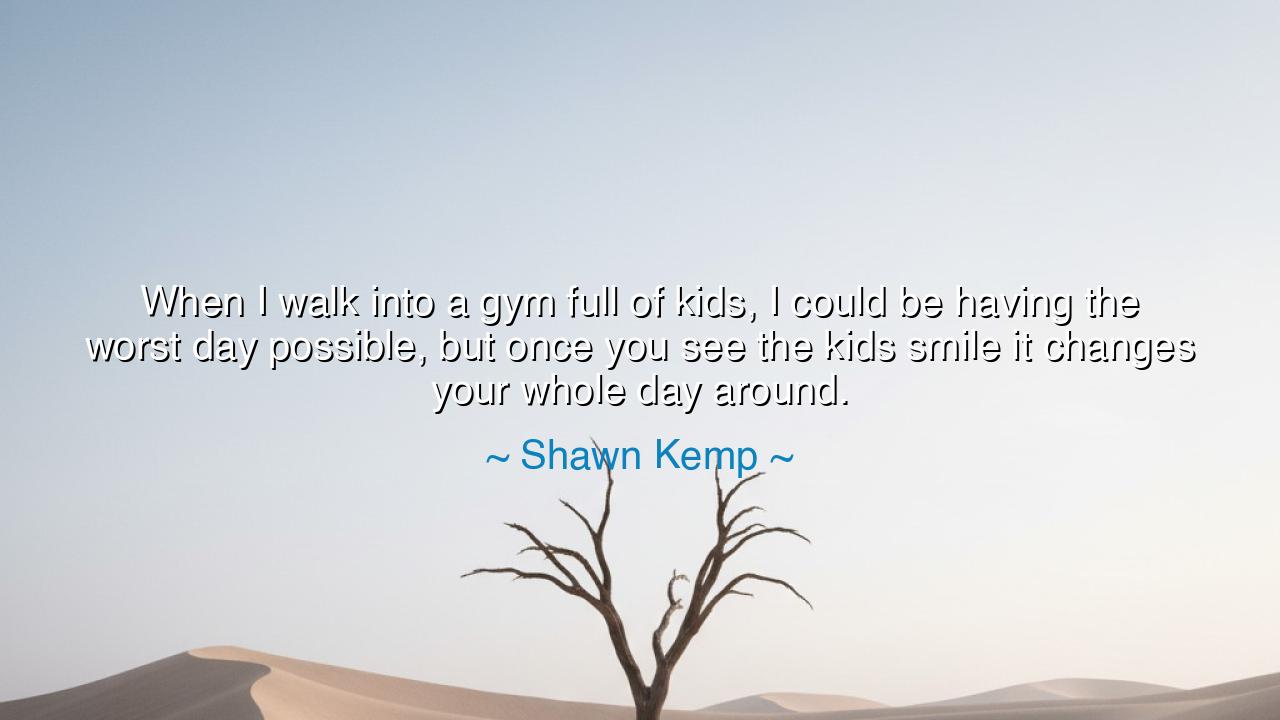
When I walk into a gym full of kids, I could be having the worst
When I walk into a gym full of kids, I could be having the worst day possible, but once you see the kids smile it changes your whole day around.






Hearken, O seeker of wisdom, and listen well to the words of Shawn Kemp, a herald of human spirit, who proclaimed: “When I walk into a gym full of kids, I could be having the worst day possible, but once you see the kids smile it changes your whole day around.” These words, simple yet profound, carry the weight of ancient truths, echoing through the corridors of time, where joy and purpose intertwine like the threads of a finely woven tapestry. In this utterance, we discover the alchemy of the human heart: how innocence, joy, and the light of youthful laughter can transmute even the heaviest burdens into moments of renewal.
Long before our modern arenas of sweat and competition, the sages of old spoke of the power of communal cheer. The Greek philosophers observed that the presence of children, pure and untarnished, could soften the sternest of souls. It was Socrates himself who, in his meditations upon human character, suggested that the gaze of the young awakens in us a dormant delight, a spark of life that reminds us of our true purpose. Kemp’s reflection is thus no mere anecdote; it is a reiteration of an eternal law: the innocent joy of others can recalibrate our own spirit, even in moments of despair.
Consider, for a moment, the story of Jackie Robinson, who, though burdened by the weight of prejudice and the sting of isolation, found solace and courage in the smiles of those he inspired. The children who watched him play, their eyes wide with admiration, became a mirror of hope. In witnessing their untainted wonder, Robinson drew strength, turning hardship into resilience and adversity into action. So too did Kemp, stepping into the gym with the echoes of his trials, yet finding a restorative force in the smiles of children who saw not his struggles but the promise of play and guidance.
There is a heroism here, subtle yet profound, for it is not forged in battle but in the quiet spaces of connection. To enter a room heavy with one’s own grief, and allow the simple laughter of youth to transform the day, is to practice a rare alchemy of the soul. It teaches that our burdens, though real, are mutable; that joy, freely given and received, can become the elixir that restores balance to the weary spirit. In this, Kemp’s words echo the lessons of the ancients: the world is not only shaped by might and cunning, but also by the capacity to embrace joy and spread it through small, deliberate acts of presence.
We may also see the truth in the teachings of the Stoics, who counselled that we cannot control the vicissitudes of fortune, but we can control our perception and our response. Kemp, amidst his own turmoil, encounters children whose smiles are untainted by his troubles. In this act of witnessing, he exercises the ancient art of re-centering, allowing external radiance to illuminate the inner gloom. It is a testament to the enduring lesson: sometimes the remedy for despair is not to flee from it, but to allow the light of others to pierce its darkness.
Let us take from this the lesson that life’s most profound shifts often arrive unexpectedly, through the simplest interactions. The ancient Chinese philosopher Confucius spoke of the virtue of attention and presence, how a single moment of genuine connection can reshape the human heart. Kemp, in his modern amphitheater of bouncing balls and echoing cheers, embodies this principle. The transformation is instantaneous yet enduring: a smile seen, a spirit lifted, a heart renewed. This is the kind of power that transcends wealth, status, and circumstance—a reminder that influence is wielded not by command, but by genuine care and presence.
Therefore, let each of us carry this wisdom into our own lives. Seek opportunities to witness the unburdened joy of others: a child’s laughter, a friend’s contentment, or even a stranger’s gratitude. Allow these sparks to temper your own hardships, to illuminate the shadows that gather in your mind. Practice the deliberate act of presence, for it is in these simple engagements that the heart finds resilience, the spirit finds renewal, and the soul rediscovers its capacity for joy.
In the end, Kemp’s words are both a mirror and a map. They reflect the ancient truth that our days are not solely defined by our trials, but also by the light we allow ourselves to receive from the world around us. And they guide us: walk into life with openness, seek the smiles, cherish the laughter, and let the joy of others become your own. In doing so, you cultivate a life of meaning, a day transformed by the simple yet profound alchemy of shared human joy.
If you wish, I can also craft a short, audio‑friendly version of this teaching, optimized for narration with natural rises and pauses, so it flows like a spoken story of wisdom. Do you want me to do that?






AAdministratorAdministrator
Welcome, honored guests. Please leave a comment, we will respond soon